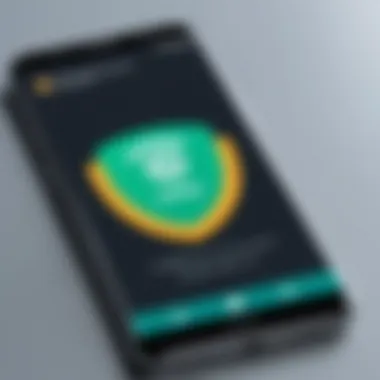Discovering Free VPN Options for Android Devices


Intro
Navigating the digital age from an Android phone necessitates a subtle understanding of security protocols. As users increasingly rely on their devices for everything, from social media to banking, shielding sensitive data from prying eyes becomes paramount. Free VPN options emerge as vital resources, granting users a semblance of anonymity in the turbulent waters of cyberspace. However, the landscape of free VPNs is fraught with both potential and peril.
Analyzing available options reveals essential aspects users must consider. This article seeks to systematically break down VPN features, benefits, and possible drawbacks. Understanding what to look for in free VPN options will empower users, ensuring they make choices that support privacy and data security.
Cybersecurity Threats and Trends
In recent times, the prevalence of cybersecurity threats has expanded significantly. Phishing attacks, ransomware, and targeted malware represent just a fraction of the threats individuals face online. This growth necessitates a critical look into strategies that enhance personal security.
Notable cybersecurity threats in the digital landscape
Cyberattack methods grow increasingly sophisticated. Cybercriminals regularly exploit weaknesses in systems, deploying malware that can disrupt services or swipe personal information. Notable examples include:
- Phishing: Fraudulent emails pretending to be from reputable sources trick many users into divulging personal data.
- Ransomware: This software blocks access to files until a ransom is paid, leading to stress and financial loss.
- DDoS Attacks: They overwhelm a website, leading to service disruptions.
Emerging trends in cyber attacks and vulnerabilities
Staying ahead of cyber threats requires acknowledgment of emerging trends. Some critical trends include:
- Increased use of artificial intelligence in attacks: Criminals apply AI techniques to launch more effective phishing schemes.
- Rise of state-sponsored cyberattacks: Tensions lead to escalation in attacks aimed at other nations.
- IoT Vulnerabilities: Internet of Things devices' increasing use becomes a target for hackers, exploiting weak security measures.
Impact of cyber threats on individuals and businesses
The repercussions of these threats are staggering. Individuals risk personal information, while companies can face legal actions, reputational damage, and loss of revenue. The need for effective cybersecurity tools like free VPNs cannot be overstated.
Selecting the Right Free VPN for Android Phones
When compromising on costs, a comprehensive approach is required to evaluate various free VPN offerings. Security features, user experience, and reliability should guide user's decisions.
In the evolving landscape, users must prioritize their online privacy over convenience. Authorities advise educating oneself to better navigate the complexity and risks of online activities. Research into available free VPNs becomes indispensable as one routes their traffic through these potential gateways to anonymity.
Understanding VPN fundamentals and their operation concerning privacy is essential. Consumers should familiarize with crucial specifications, which can significantly impact their overall security.
By intersection knowledge on cybersecurity threats and free VPN functionalities, individuals can adopt well-informed strategies to bolster their digital protection.
Prologue to VPNs
Virtual Private Networks, commonly known as VPNs, play a vital role for users navigating the online world, especially on mobile devices such as Android phones. Understanding how VPNs function and their significance can help users secure their privacy and enhance their digital experience. VPN technology allows users to access the internet anonymously by routing their connection through a remote server. This process alters the user's IP address, making it more difficult for online entities to track their activities.
The importance of VPNs for mobile users cannot be overstated. With the rise of public Wi-Fi networks, mobile users often find themselves vulnerable to network snoopers and cyber-attacks. Utilizing a VPN not only protects personal information from prying eyes but also ensures a more secure browsing experience. Many users may underestimate the potential risk stemming from unsecured networks, but research indicates that attacks are increasingly common.
With this knowledge, users can begin to appreciate the collective effort required to safeguard personal data. The subsequent sections will outline various types of VPNs—including free options specifically tailored for Android phones—highlighting their features, risks, and recommendations. Ultimately, this understanding will empower users to navigate the complexities of digital security with a better grasp of their choices.
What is a VPN?
A Virtual Private Network, or VPN, is a technology that connects your device to the internet through a secured, private connection. This connection encrypts your data and routes it through a remote server, effectively masking your actual location and IP address. VPNs facilitate anonymous internet browsing, protecting users from surveillance and considerably enhancing aspects of online security.
Typically used to protect sensitive data in public Wi-Fi locations, a well-functioning VPN enables users to engage with various online content safely. People employ VPNs for multiple reasons, including bypassing geo-restrictions or accessing censored material. The technology is becoming increasingly integral to maintaining online privacy, especially as digital data becomes more susceptible to breaches and tracking by corporations or malicious actors. However, it is crucial to select a trustworthy VPN provider, as the value you gain from a VPN is largely dependent on its quality and actual implementation of safety measures.


Importance of VPNs for Mobile Users
Mobile devices have become extensions of our daily lives, often storing essential personal information. Therefore, users should be acutely aware of the potential risks. Often, mobile users engage in online banking, shopping, and other services that require data integrity and confidentiality.
Key benefits of utilizing a VPN on mobile include:
- Data encryption: Protects sensitive information shared over the internet.
- Secure browsing: Shields users from unsolicited advertising and tracking techniques.
- Accessing restricted content: Users can reach content that may be unavailable in their geographical location.
- Anonymity online: Hides the user's IP address, making it challenging to trace activities back to them.
Regularly using a VPN is often deemed a best practice, serving as an underlying framework to bolster individuals' active engagement in their online security.
In summary, recognizing the relevance of VPNs—specifically how they create safer mobile experiences—provides a fundamental step towards better understanding further examination of the free options available for Android devices later in the article.
Understanding Free VPNs
Free VPNs offer an intriguing gateway into the world of online anonymity and the protection of private information. They enable users to secure their internet connections without incurring financial costs. In this section, we will delve into what makes free VPNs appealing, while also critically examining the potential pitfalls associated with their use. Understanding these factors is vital for anyone considering a VPN option on their Android device.
The Appeal of Free VPNs
One principal reason for the appeal of free VPN services is accessibility. Not everyone can afford premium VPN solutions, or they might simply wish to explore VPN technology without financial commitment. Free VPNs serve as a valuable entry point for users wanting basic privacy features.
Another notable advantage is the wide range of options available. Many free VPN providers offer tools that come with effective features such as basic encryption and no data caps. This breadth enables users to test various solutions and select the one that meets their needs, even before considering paid alternatives.
The convenience provided by mobile apps is also a considerable plus. Many free VPNs develop dedicated applications for Android devices, making it easy for users to install and set up. The installation process often requires just a few clicks, enhancing the overall user experience.
At the same time, some free VPNs provide reliable connections that may surprisingly rival free services. This encourages users to consider their options seriously.
Potential Risks of Using Free VPNs
While free VPN services provide undeniable benefits, they are not devoid of significant risks. Users must remain cautious, as some free VPNs do not guarantee the requisite privacy and security. Here are essential points to contemplate:
- Data Leakage: Users may unknowingly expose sensitive information. Free VPN providers may also implement www tracking techniques to collect user data.
- Limited Encryption: Not all free VPNs offer robust encryption standards. This limitation risks the very online privacy users seek.
- Performance Issues: Many free VPN apps suffer from slow speed and unstable connections. These drawbacks degrade general online experiences.
- Advertisements and Monetization: Some free VPNs are noisy with ads or may sell user data to third parties to generate revenue, fundamentally compromising user trust.
"Opting for a free VPN requires a careful examination of the risks vs. rewards. Ignorance in this decision can lead to unwanted data exposure."
Key Features of Reliable Free VPNs
When chooseing a free VPN for your Android phone, it is involatively important to consider its key features. Other than the fact that it is free, the quality of service provided by the VPN solution is crucial for ensuring secure browsing and online privacy. This secion will detail the essential features to look for, such as logging policies, encryption standards, and user interface experiences.
No Logging Policy
A fundamental aspect of any credible VPN is its logging policy. The phrase ‘no logs’ means the service does not keep records of users’ online activities. These records can include your browsing history, IP address, and other sensitive information, which can pose a privacy threat if accessed by third parties.
A strong no logging policy is critical because it aligns with the tenets of true online privacy. When users engage with a VPN, they expect anonymity. If a VPN provider keeps logs, it defeats the core purpose of using a VPN in the first place. Always look for a VPN that explicitly states its no logging commitment.
Encryption Standards
The success of a VPN depends significantly on its encryption capabilities. Reliable free VPNs utilize strong encryption standards such as AES-256. This type of encryption is widely regarded as unbreakable and is critical for keeping your online activity away from prying eyes.
Encryption works by transforming your internet data into an unreadable format as it travels through the online environment. Thus, in the event that your data is intercepted, it cannot be easily decoded. For anyone concerned about online security, the level of encryption utilized must be a priority while choosing a VPN. Look for clear information about the encryption technology a VPN employs.
User Interface Experience


User interface experience can often be overlooked; however, it significantly influences how comfortably one can use a VPN. A intuitive and easy-to-navigate interface enhances the user experience, especially for those who may not be as tech-savvy.
Considerations for user interface include:
- Simplicity in Design: A clean, straightforward layout is advantageous.
- Connection Options: A simple one-click connection option can save time.
- Accessibility on Devices: Ensure it fits seamlessly on Android formats.
An effective user interface fosters efficient use, turning what can be a complex arrangement into a manageable endeaver.
Top Free VPN Options for Android
Selecting the best free VPN options for Android is crucial for users who prioritize their online security. The landscape of virtual private networks (VPNs) offers many choices but knowing which options offer reliability and performance is key. Many users turn to free VPNs as a way to enhance their privacy without financial commitment. However, they face the challenge of distinguishing between effective VPNs and those that could compromise their data. Thus, it is essential to evaluate the features, reputations, and specific benefits of each free VPN before making a decision.
VPN A: Key Features and Performance
VPN A is popular among users seeking basic online privacy. It provides essential features such as a solid no-logging policy and encrypted connections. Users appreciate its speed because it ensures quick browsing and streaming capabilities. Users may value this aspect for various activities on their Android devices, like using social media or watching videos.
Moreover, the app interface is straightforward, making it suitable for novice users. Updates are fairly frequent and result in better stability and security patches. However, while the free version limits some bandwidth, the overall experience remains quite satisfactory. The VPN community gives solid feedback on speed and useability.
VPN B: Key Features and Performance
VPN B distinguishes itself with robust security measures. It employs AES-256 bit encryption, which is often considered the gold standard in security. With a user-friendly application layout, it is designed to ensure even non-tech-savvy clients can navigate easily. The speeds provided by this VPN are competitive against many premium options, which is an added advantage for those using it for video streaming or online gaming.
There are no data limits; however, users may encounter occasional slowdowns during peak usage times. The level of trust associated with VPN B is generally high, thanks to a transparent privacy policy. Regular audits by third-party security experts add an extra layer of credibility. Nevertheless, users should always read the terms of service carefully to understand potential limitations.
VPN C: Key Features and Performance
VPN C focuses on offering features that cater to a range of user-applications. It also includes a very helpful DNS leak protection, which is imperative for maintaining true anonymity online. Proper data encryption is implemented, ensuring that user information remains out of reach from potential threats. Many users find comfort in deploying this VPN while accessing social media or performing sensitive transactions.
Performance can vary; while it excels usually, some users might experience minor speed hesitations during heavy internet usage times. The support availability for VPN C is notable because quick responses can be crucial when issues arise. It does offer a simple interface that makes processes straightforward to understand, aiding in a smoother user experience.
Overall, by assessing these free VPNs, users make informed decisions. Evaluating features such as security measures, speed, reliability, and ease of use is indispensable in their selection process.
Performance Comparison of Free VPNs
Evaluating the performance of free VPNs is essential when considering which service to choose. Performance influences the overall user experience, impacting speed, stability, and reliability. A VPN's capability to deliver a secure and quick connection is pivotal. Users often look for smooth browsing and resilient performance, making this aspect indispensable in assessing free VPN options for Android phones.
Speed Tests and Latency
One of the primary metrics for evaluating free VPNs is their speed. Speed tests measure how fast the VPN can transmit data compared to a direct internet connection. Latency, the delay before transferring data begins, is also for users. High latency often leads to slow performance, resulting in noticeable lag during online activities such as gaming or streaming.
To conduct an effective speed test, it is advised to choose a reliable test server. Similar to regular bandwidth tests, users can initiate tests before and after connection through the VPN. These evaluations will enable a tangible assessment of the VPN's impact on internet speed.
- Perform tests multiple times at different times of day.
- Check both download and upload speeds.
- Record latency in milliseconds.Before assuming a free VPN significantly boosts performance, noticing that day-to-day use often depends on server locations and congestion can help understand typical behavior over varying times.
Connection Stability
Connection stability is another critical consideration when evaluating free VPNs. Users often experience interruptions or unexpected disconnections, which can lead to frustrations. A stable connection ensures that users remain online without encountering sudden drops in the VPN. This is particularly crucial for streaming content or during online sessions requiring steady connectivity.
Regular disconnect events may arise from various factors, including server overload or unstable network infrastructure. A free VPN’s resources can affect its ability to maintain a strong connection consistently.
When testing for stability, keep these points in consideration:


- Notice habits of disconnections.
- Assess time your VPN maintains a connection.
- Check performance across different servers.
Privacy and Security Considerations
Privacy and security are cornerstones when selecting a VPN, particularly free ones. Users expect these tools to provide not just served access to restricted content, but also essential protection for their online activities. With rising concerns about data breaches and online tracking, understanding how free VPNs manage privacy and security is crucial.
Data collection practices can greatly differ per provider. Some free VPNs may track user activity and gather data for advertising or selling to third parties. This raises significant privacy concerns, as what is meant to be a safeguard becomes yet another means for invasion. Being aware of this can help users make better informed choįces on what to prioritize in a VPN.
What Data is Collected?
When utilizing a free VPN, it is imperative to comprehend the data collection policies inherent within these services. While most expect immediate anonymity, many free VPNs log data for various reasons. Common types of collected data may include:
- Connection logs: They often keep track of when and where a connection is established.
- Traffic logs: Certain providers might analyze the duration and nature of user activities during that time.
- Personal information: Apps may request email addresses or other identifiable data during the download or signup process.
This logged information could potentially lead to identifications or usage patterns exposed to outside parties. A transparent privacy policy is essential, ideally indicating a no-logging policy where user data remains intact.
Malware Risks with Free VPNs
The temptation of free services often blinds users to inherent risks. Unfortunately, many free VPNs can prove harmful rather than helpful. There are known instances where alleged VPN services introduced malicious software. This malware can steer clear to privacy violations or even large-scale data breaches.
Aspects to consider regarding malware risks include:
- Inadequate app vetting: Free solutions may not have undergone rigorous security checks.
- Unexpected ads and pop-ups: Some gratis VPNs monetize through aggressive ad placements that may obscure a user’s identification.
- Automatic connections: Applications with poor design adhere users to automatic links that share real IP addresses.
A basic recommendation is to check app reviews and research the provider thoroughly before installation. Lack of transparency concerning service strategies often signals issues.
Caution is key. Assess VPN trustworthiness before taking any action.
Best Practices for Using Free VPNs
Using a free VPN requires careful consideration and informed choices. Even though free VPNs can offer subjectively appealing options for securing your online activities, they often come with inherent limitations and potential risks. Establishing best practices ensures users maximize their effort to protect privacy and security while navigating this equipped digital landscape. This section explores various strategies that promote safety and enhance knowledge in the use of free VPNs.
Navigating Privacy Settings
Navigating privacy settings is essential for optimizing the protection afforded by a VPN. Many users may overlook how important these configurations are. By reviewing privacy options, you can fine-tune the level of security you're achieving. Here are some practical steps to assist in this.
- Review Permissions: When installing a free VPN on your Android phone, pay attention to the permissions the app is requesting. Limit access to only what is necessary for basic functionalities.
- Configure Data Usage: Some free VPNs may track your data usage. Adjust settings to minimize this tracking while using the service, if possible.
- Kill Switch Option: Look for a kill switch feature. It ensures internet access stops immediately if the VPN connects drops. This prevents your data from being accessed by ISPs or cybercriminals.
- Regular Updates: Keeping the VPN app updated is vital. Updates often include not just added features but also important security fixes that reduce vulnerabilities.
It is crucial to stay updated with the latest improvements and potential privacy policies that affect your chosen VPN application.
Combining VPN with Other Security Tools
For all its benefits, a free VPN alone may not provide absolute security. Therefore, integrating a VPN with other security tools can significantly enhance online protection. This way, you create multiple layers of security. A few methods to achieve this integration include:
- Antivirus Software: Use reputable antivirus software alongside a VPN. It helps to identify and block malware while browsing, which enhances your system's protection.
- Firewall: Employ system firewalls. They can monitor incoming and outgoing traffic and block suspicious activity.
- Password Managers: Deploying a password manager adds another level of security. This ensures that your passwords are unique and difficult to breach.
- Secure Cloud Services: Utilize secure cloud storage options, which not only offer secure spaces for files but often have good encryption measures in place.
Combining these tools establishes a safer, more reliable online experience. This synergy maximizes the inherent benefits of a free VPN, providing a resilient defense against various online threats.
Ending
In the realm of online security, understanding how to choose an appropriate VPN is essential. This article focused on the landscape of free VPN options available for Android phones, illuminating their advantages and limitations. Each aspect discussed here reinforces the importance of making educated choices when it comes to digital privacy.
Making Informed Choices
Free VPN services can attract users with their no-cost models, yet understanding the intricacies of each option is vital to safeguard personal information effectively.
- Evaluate Trustworthiness: Check the reputation of the selected service. Research reviews and experiences from other users before making a commitment.
- Scrutinize Privacy Policies: Review the privacy policies with attention to what data is logged. A solid no-logs policy is critical.
- Performance Assessment: Always consider speed, stability, and connection reliability. Users may need to test several options before settling on one.
- Assess Security Features: Features such as encryption strength and protocols must be adequately examined. Make sure to clarify which features are available and if they align with your needs.
- Supplement with Other Tools: Combine the VPN with other security measures like antivirus software. This offers wider coverage against potential threats.







